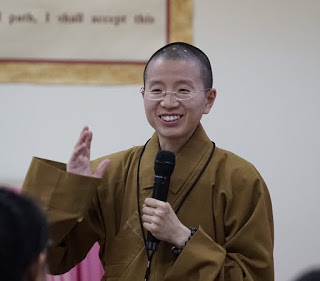
Speaker: Venerable Zhixing
Fo Guang Shan Hsi Lai Temple, Los Angeles
I. Introduction
Auspicious greeting to all friends from around the World! This is Venerable Zhixing from Fo Guang Shan Hsi Lai Temple in Los Angeles, United States. Thank you for joining our online English Dharma service. For the coming four Dharma services, I will be sharing some core teachings of Buddhism with all of you. I will be making reference from Venerable Master Hsing Yun’s book, Buddha-Dharma: Pure and Simple.
II. Dependent Origination
One of the most fundamental teaching and one that is distinctive to Buddhism is dependent origination. It is also the truth that Sakyamuni Buddha is awaken to when he attained enlightenment under the Bodhi tree. What is dependent origination? What does it mean to our life? These are the two main questions that I will be answering and sharing with you today.
One might wonder: aren’t understanding what dependent origination is enough? We have to always remember that these teaching, known as the Dharma, or the truths are in our life. They are the truth of how the universe runs. The Buddha told us that all the teaching that he taught are to help us understand our suffering, dissatisfactions, and how to end them. Thus, aside from understanding what the teaching are, it is even more important for us to understand what it means to our life and how we can apply them to end our defilement and dissatisfactions.
So, what is dependent origination? The sutra said, “If this exists, that exists; if this ceases to exist, that also ceases to exist,” In everyday language, it means that everything arises in dependence of other conditions. Everything arises from causes and conditions. Without the right causes and conditions, the effects or the resulted phenomena would cease to be.
Example of a Seed
A very simple example would be planting a flower. The seed is the causes. Flower is the effect, or the final outcome. For the seed to grow to a flower, it required different conditions or factors. The conditions are water, fertile soils, air, and sunlight. All these are very important conditions, without any of which the seed would not grow to bloom flower. If we put the seed on a plate and leave it there. The seed would never grow into a plant because it lacks the conditions for it to grow. If we put the seed in the soil, but we don’t give it any water or we give it water, but don’t give it any sunlight. The seed won’t grow either. What this is telling us is that for each cause to become an effect, it needs to have all the required conditions.

Example of Apply to College
Aside from plant, phenomenon like applying to college is also the same. If we want to apply to college, the result that we want to achieve, we need to work hard at school, get good grade, attend different extracurricular activities, apply for college and so on. If we don’t work hard in school or if we don’t apply, it might be very hard for us to succeed in getting into college.
From these two examples, we can see that everything whether it’s something as small as a plant to something that happens in our life arise from causes and conditions.
With this said, we need to understand that “we reap what we sow”. If we plant apple, we can’t expect it to reap orange. When we do good deeds, we will have good effects. When we do bad deeds, we will have bad effects. In another words, what goes around comes around.
Poisonous Pancakes
Once, a lady cooked pancakes every day. She knew that there is a homeless man who lived close by. Thus, she would always leave one pancake by the window sill. The homeless man would pick up the pancake and left without saying thank you and any word. At first, the lady didn’t think too much. As days pass by, she slowly became angry with the homeless man thinking that he is very rude and ungrateful. The more that she thought about it, the angrier she became, until one day, an evil thought arose.

For one moment, she thought of putting poison on the pancake that she was making. However, she suddenly chided herself for thinking such evil thought as she wanted to help others in the first place. She wasn’t doing it for their gratitude. Thus, she just cooked the pancake and put it on the window sill as usual.
This lady had a son who had gone out of town for business, but he hadn’t returned as he was supposed. A few days later, her son looking like a homeless came back. He told the lady that he almost died along the way as he got robbed. He was at the point of starving to death when a homeless man gave him a pancake. He regained energy to walk back after eating. When the lady heard about the pancake, she had a moment of panic thinking that it might be the pancake she made. If she had really put poison on the pancake, she might have killed her own son. Her kind heart that won over the evil thoughts in the end saved her son. She was more convinced about causes and effect and started to help more people.
From the above story, we can see that wholesome deeds and unwholesome deeds have their corresponding effect. Thus, this is why we should always do the three acts of goodness, do good deeds, say good words and think good thoughts.
III. Understanding Causes and Effects Inspires Gratitude
Now that we learn about dependent origination, what does it mean to our life? Understanding causes and conditions would help us be very grateful for all that we have, and it help us understand that our future lies in our hands.
Why would understanding causes and conditions will fill us with gratitude? Imagine this: When you go home after a day of work and start to enjoy the foods in front you, have you ever taken the time to observe all the causes and conditions that are required in order for you to enjoy this meal? Next time you eat, take a moment and contemplate upon all the causes and conditions that are behind the food in front of you.
Causes and Conditions in a Meal

If we just look at our bowl of rice, there need to be farmers who grow the rice, someone to harvest them and transport them for processing. Afterward, someone needs to package the rice and transport them to the market. Our parents or our loved one would need to go to the market to buy it, then wash and cook the rice before we have it in the bowl in front of us. These are only the causes and conditions behind our bowl of rice, not to mention the two to three dishes of food that are also in front of us.
Contemplating as such, how can we not be grateful for the meal we have in front of us? How can we not value every single grain of rice? We have to be grateful that we don’t need to grow our own food and process them. Otherwise, we would not have time to do other things. From this, we can also see that we are all interdependent. We need each other to live in this society. We are one. Thus, we need to work together to make the world a better place.
Causes and Conditions in Our Upbringing
Aside from contemplating about food, you can also ask yourself the following. Have you ever thought about how you grow up to be who you are today? May be you might say I achieve the success that I have today is because of my hard work and effort. Our effort is definitely an important factor. However, think again. We can’t grow up without the support of others. When we grow from a baby to an adult, our parents or family take care of us, provide us with food, shelter, clothing and teach us various life lessons. We have various teachers to give us education and guidance. We have friends who accompany us as we grow up. Not to mentions all our basic necessity and how everything we get to enjoy like movies, computers, cell phone are made and provide by others. Thinking about all these conditions that help and support us into growing who we are, how can we not be grateful to our parents, family, friends, mentors, and our nation. Venerable Master Hsing Yun once said, “Gratefulness is like firework, which can bring joy to the world.” If we have gratitude, our life will be filled with happiness.
IV. Our Future is in Our Hands
Another important implication of dependent origination is that it tells us that our future lies in our hand. A cause, supported by conditions, will become an effect. If we understand this, it means that we are the creator of our future because how we would be in the future will depend on what we do right now. The story of how Waldorf Astoria Hotels come above really shows us how our fate lies in our hands.
Example of the Waldorf-Astoria Hotel
On one rainy night, an old couples went into a motel and wanted to stay overnight. The young clerk at the counter apologized and told them that the motel was full. However, if they didn’t mind, they can stay overnight at his dorm room since he would need to work overnight. The old couples saw his sincerity and accepted his offer. Next morning, they went to the counter to pay for their room. The young clerk told them that they didn’t need to pay because it was his dorm room. When the old couples heard this, the old gentlemen complemented him and said, “You are the dream employee any employer can have.”
A few years later, the young man received an invitation letter from the old gentleman and a plane ticket to New York. The young man went to Manhattan New York and saw the old gentleman stood in front of a new hotel on the fifth street. The old gentleman told him, “this is the hotel that I built for you and I want to invite you to manage it.” The young man who had provided great service and care to the customers was Mr. George Boldt and the hotel is the renowned Waldorf Astoria Hotels.
Mr. George Boldt became successful because of the great services he provided to the old couples. If he had not being caring and let them stayed overnight, he might not have such good opportunity. He cultivated these good conditions through his wholesome deed.
V. Conclusion
Thus, next time when we encounter setbacks or failures while working toward our goal or dream, we should always remember that we can still reach them as long as we continue to work hard and create all the conditions that are required. We are the creator of our future.
Understanding depend origination will fill us with gratitude and help us work toward a bright and better future.
Last, but not least, thank you for joining us in this cultivation session. May Buddhas and Bodhisattvas bless everyone with happiness and peace. May everyone be safe and well. Amitofo.
Buddha-Dharma: Pure and Simple 1

In today’s Buddhist sphere, numerous claims have been made on what the Buddha has taught. However, were they truly spoken by the Buddha? The Buddha-Dharma: Pure and Simple series is an exploration of over 300 topics, where Venerable Master Hsing Yun clarifies the Buddha’s teachings in a way that is accessible and relevant to modern readers. Erroneous Buddhist views should be corrected, the true meaning of the Dharma must be preserved in order to hold true to the original intents of the Buddha.
Published by: Fo Guang Shan Institute of Humanistic Buddhism
Read it here

